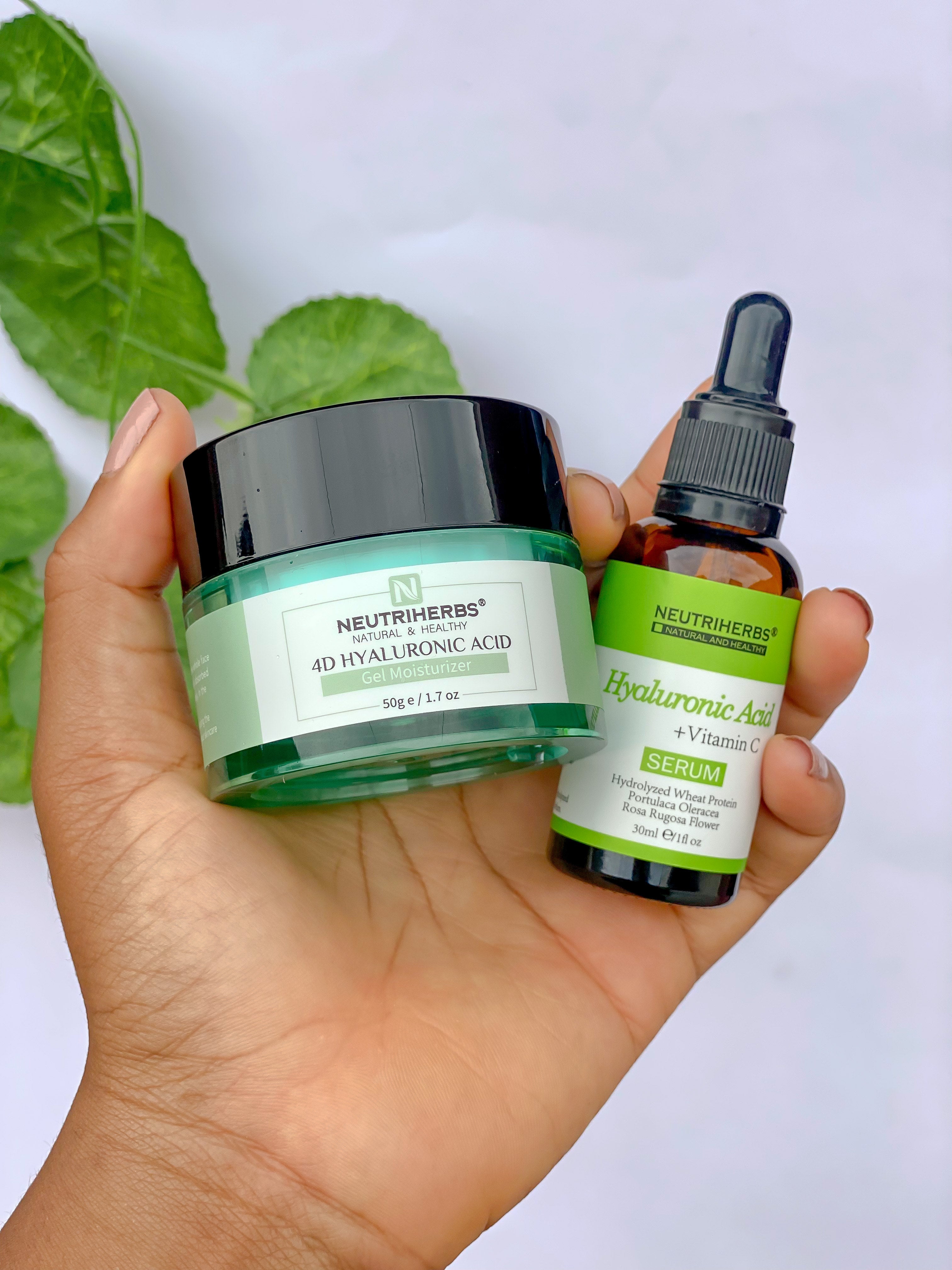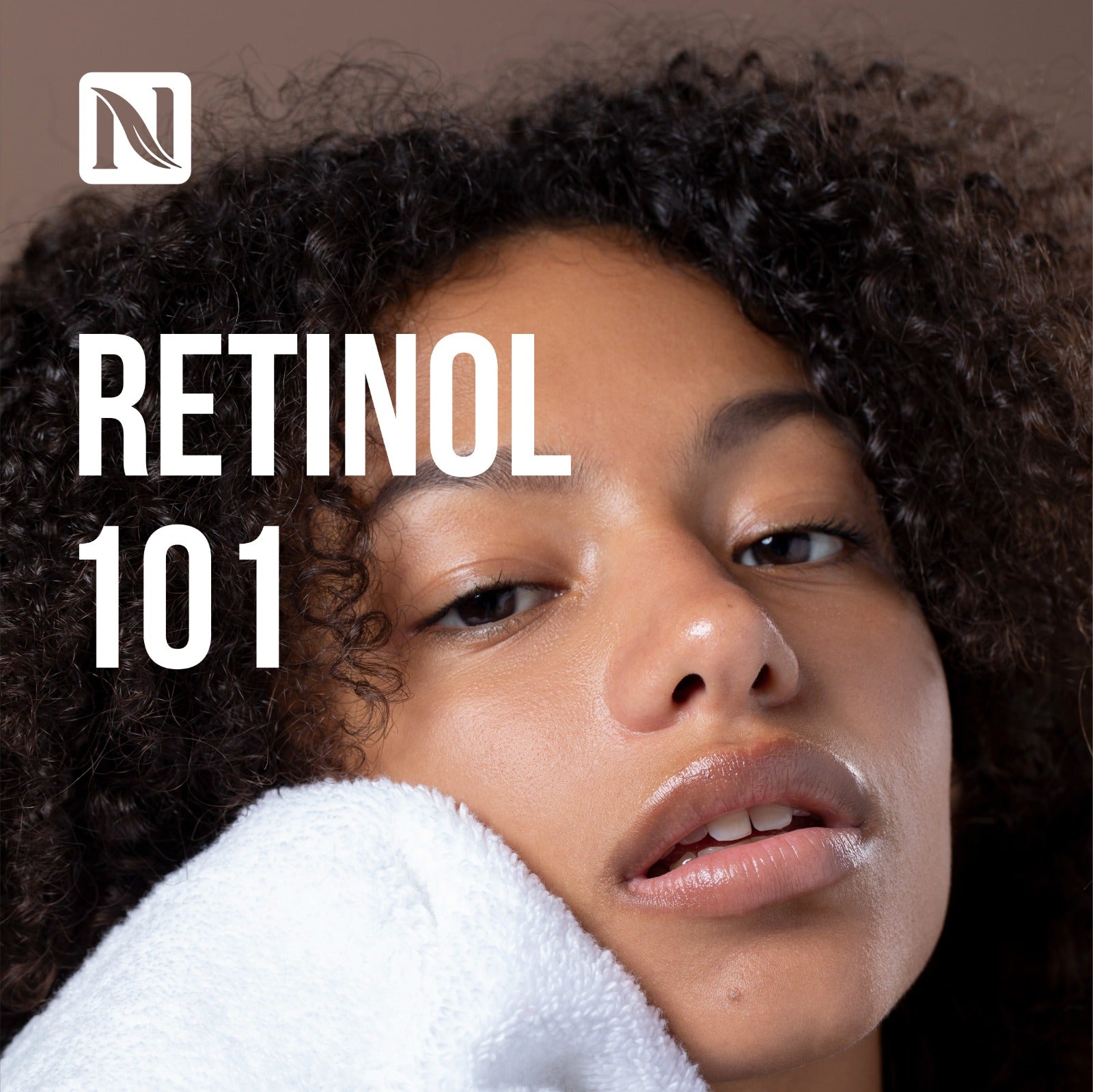
Hyaluronic acid is without doubt one of the most popular ingredient found in most skincare products.
If there’s one thing our bodies need constantly, it’s hydration — inside and out. No matter what season it is, our bodies require moisture, and as it gradually gets warmer, the sun will begin zapping it from our skin more regularly.
That’s one of the many reasons hyaluronic acid (HA) is essential. It’s a powerful humectant found naturally throughout our bodies that keeps your skin replenished with the hydration it needs. It’s a superstar at alleviating dry skin and a moisture binder which means that it will attach itself to the water in the cells making them plump.
Because of it’s striking ability to draw moisture from the air, keep skin moist and hold almost 1000 times it’s weight in water, it makes for an incredibly powerful moisturizer.
But there's more:
7 Benefits of Hyaluronic Acid For Skin
Hyaluronic acid is a natural substance found in our skin, eyes and joints. While many of us were once unable to pronounce its name, we now can’t escape it since this powerful hydrator has become increasingly popular in the beauty world, particularly as a go-to ingredient in skincare. With a unique capacity to retain water, there’s no wonder it’s taken the industry by storm.
-
Promotes Healthier More Supple Skin
Hyaluronic acid can help your skin look and feel more supple. Roughly half of the hyaluronic acid in your body is present in your skin, where it binds to water to help retain moisture.
However, the natural aging process and exposure to things like ultraviolet radiation from the sun, tobacco smoke and pollution can decrease its amounts in the skin.
Using hyaluronic acid skincare may prevent this decline by giving your body extra amounts to incorporate into the skin to make it look healthy and supple.
-
Enhance your Lipid Barrier
The best way to explain the lipid barrier is by describing it as a wall.
The skin has a protective lipid barrier that helps skin stay supple and youthful. Imagine your skin cells are the bricks in the wall, and the mortar, which is holding the bricks together, is your lipid barrier.
With age, this barrier can become compromised and start to perform less of its crucial functions effectively as cells and lipids lose moisture, collagen and become damaged from exposure to the elements.
Hyaluronic acid can help slow the deterioration of this layer and can help treat damaged lipid layers by providing the moisture that the skin craves and needs to function
-
Reduces Fine Lines and Wrinkles
Hyaluronic acid has also proven to have a noticeable anti-aging effect on the skin. When applied topically, some age-defying benefits include: plumping, smoothing, firming and even significantly reducing the appearance of fine lines and wrinkles.
-
Hydrates and Plumps your Skin
Hyaluronic acid has incredible water binding capabilities - one gram of hyaluronic acid can hold up to 6 liters of water. Hyaluronic acid hydrates from the outside in by drawing moisture from the humidity in the air to bind with your skin.
In addition, hyaluronic acid “plumps” your skin, making it look radiant and youthful by decreasing “epidermis water loss” associated with age, sun exposure, dryness or flakiness which makes it a Go-to solution for dry, matured and dehydrated skin types.
-
Hydrates without Clogging Pores
Yes, we want to hydrate, but not at the cost of clogged pores. Hyaluronic acid is non-comedogenic - meaning it hydrates without clogging your pores, making it a great moisturizer for oily and acne prone skin. FYI: If you have oily skin, that does NOT mean it’s hydrated. In fact, skin can overcompensate and produce extra oil when it’s dehydrated, so hydration is key for all skin types, even for oily and acne prone babes.
-
Antioxidant Properties
Hyaluronic acid provides extra support for the collagen and elastin in your skin that are often damaged by UV rays and environmental stressors.
-
Reduce Pigmentation
Hyaluronic acid can help you reduce pigmentation and blemishes associated with age when used in combination with brighteners.
A common cause of hyperpigmentation is when damage to the skin caused by excessive sun exposure occurs.
Vitamin C is one antioxidant that combats dark spots caused by sun exposure. It helps prevent melanin production, which can help brighten the skin and reduce pigmentation.
When pairing Vitamin C and Hyaluronic Acid, the moisture Hyaluronic Acid provides allows active brighteners to function more effectively - meaning that it’s more effective in reducing the effects of skin pigmentation.
Boosting moisture and brightening skin tone were exactly the reasons behind combining Hyaluronic Acid and Vitamin C in our Hyaluronic Acid Serum, check it out!

What You Must Know Before Buying a Hyaluronic Acid Product
In skincare, what determines how well products penetrate the skin is the molecular weight. The lower the weight, the more it can penetrate.
When choosing which hyaluronic acid products to incorporate in your skincare regimen, it’s important to keep in mind that not all hyaluronic acid is created equal. Believe it or not, the hyaluronic acid in serums and moisturizers often comes in different forms or molecular weights.
The smaller the molecule, the deeper the ingredient can penetrate to reach lower layers of the skin (the dermis) while the larger molecules hydrate closer to the surface (the epidermis). Seeing as though both are important for reaping the full benefits of hyaluronic acid and achieving optimal results, consider incorporating products formulated with multiple forms of hyaluronic acid.
After all, topical application of this beneficial ingredient supports the skin’s natural ability to retain moisture in every layer of skin, so adding a multi-form hyaluronic acid to your routine will help you achieve a youthful radiance from deep within.

Our Recently Launched, deeply nourishing high potency 4D Hyaluronic Acid Gel Moisturizer is far more than your standard hyaluronic acid creams or serums. It’s uniquely designed with 4 forms and 2 natural building blocks of hyaluronic acid, an exclusive technology known as the Hyaluronic 4D Multi- Complex.
We utilize 4 forms of hyaluronic acid, all of which work in the 3 different layers of the skin (Dermis, Epidermis and subcutaneous fat layer) to create a three-dimensional matrix of hydration.
This 4D Hyaluronic acid Complex, therefore, has both an instant and long-lasting effect, helping to increase the feel of skin cushion, reduce the appearance of fine lines and wrinkles and replenish essential moisture deeper than ever before.
This exclusive technology allows the skin to create and hold onto more of its own moisture.” In doing so, it visibly smoothens, firms and plumps your skin, leaving it looking soft, supple and rejuvenated from the inside out and outside in.
How to Apply Hyaluronic Acid & How Often Should You Use It?
To reap the full benefits of a hyaluronic acid, We recommend applying it to clean, damp skin up to twice a day. Why damp skin? Because hyaluronic acid binds to and retains water, which means that when it’s applied to a dry face, it can pull water from your skin causing trans-epidermal water loss. Applying hyaluronic acid to damp skin will allow the ingredient to absorb and retain the excess water instead.
Once fully absorbed, proceed with the rest of your skincare routine and then apply makeup, if desired. Remember! Hydrated skin doesn’t just look beautiful bare, it also creates a better canvas for makeup application as it helps to minimize texture under foundation and concealer. A win-win!

As an added bonus, hyaluronic acid also plays well with most other skin actives, making it easy to pair with peels, retinols, vitamins, and other acids. The only exception could be combining the ingredient with acids containing lower pH levels, like glycolic, because it may ultimately degrade the HA, rendering it ineffective.
When it comes down to it, there’s a reason hyaluronic acid has built a reputation as a go-to source for hydration. With regular use in your skincare regimen, you’ll experience the many benefits of hyaluronic acid firsthand and notice your skin looks more nourished, plump, smooth and firm.
Checkout New 4D Hyaluronic Acid Face Gel Moisturizer
Do you currently use Hyaluronic Acid in your routine? Share your experience with us in the comments below.


